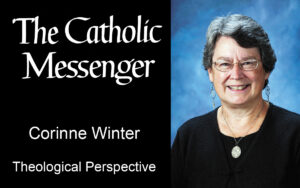
As November ends, darkness seems to close in on us. The bright leaves of earlier weeks have fallen and had to be raked. The tree branches appear dark and bare against a sky that blackens even before suppertime. Yet even as the dark takes over, the church calendar calls us to enter hopefully into a new year. During Advent, we hear the voices of the prophets calling us to turn anew to God who calls us into a covenant relationship. We are reminded of God’s promises and urged to be faithful as God is faithful to us.
As we celebrate Advent, hearing the prayers and readings for the season, we might be tempted to think we are primarily recalling history. That sense of distance in time can be reinforced by our ways of depicting the nativity scene. Certainly, the Gospel accounts of Jesus’ birth and of its proclamation to shepherds and wise ones are inspiring. We are moved to give thanks for Jesus’ coming and for our salvation through his work. Still, at times, the paintings and statues look more like people from a story than they do like people with whom we have a relationship.
The prayers of
the Advent liturgies call us beyond recollection of a past event. We pray during Advent not only in thanksgiving for what has happened in the past, but also in anticipation of the coming of Christ. We look forward not only to the celebration of Jesus’ birth in the past, but to his coming in grace into our daily lives, and to his final coming.
As Christians, we believe firmly that the Son of God became human for our salvation, being born in a specific time and place. Christians have come to picture that historical event in a particular way and so our nativity scenes connect us with Christians of other times and places. Nothing seems particularly wrong with that as long as we don’t stop there. For Christ promises to be with us always. Our reflections on the baby, a mother and a (foster) father, should expand to appreciation of all children and of those who love and care for them, as well as for all people and all of creation. Through life, love and generous care for others, God’s presence in the world continues to be manifest. By contrast, where love and care are missing, where people are physically or spiritually undernourished and/or abused, the Good News is lacking. As we celebrate Advent, we should experience an urgency to reach out in love. St. Augustine in Christmas sermons admonished his listeners that all of us are called to bear Christ to others. We share that mission with Mary who is rightly called Mother of God.
Hoping for the final coming of Christ in glory means participating in building up the reign of God on earth. With so much darkness, division and sin apparent in the world, what we need to do may seem impossible. So too, according to the Gospel of Luke, did Mary’s motherhood seem impossible. The same Holy Spirit who overshadowed Mary can fill us as well, giving us the hope we need to be who we are called to be.
That is why, as we begin the Synod process, we pray urgently to the Holy Spirit. As Church, we are called in a particular way to be a sign of Christ for the world. We recognize that we need to do a much better job of that. Many people, including some who were once members of the Church, are not being reached by the Good News. We need to hear them. The documents of Vatican II remind us that we can hear the call of the Spirit by attending to the needs of the world.
We can also hear the call of the Spirit by listening to one another. Sometimes we think that the Spirit guides the Church only through its ordained leaders. Indeed, those who are ordained receive gifts of the Spirit to play a special role in the community of faith. However, the Spirit is present in the whole Church and in every member. All of us are anointed by the Spirit at our baptism, initiated into the three-fold mission of Christ as priest, prophet and king.
As we enter into the season of Advent, may we be open to the Spirit who “spoke through the prophets,” and speaks still. Responding to the presence of the Spirit who was in Christ and is in the body of Christ, may we find the light of hope and refuse to let the darkness win.











